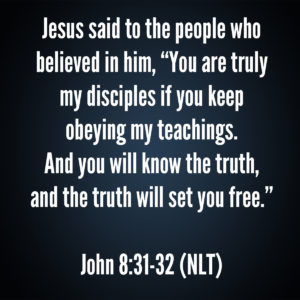Are Our Good Deeds Important?

I was a very rebellious individual in my younger days and one of the most challenging parts of becoming a Christian, even after believing in God’s existence, was that I knew my rebellion had to be broken if I was going to be able to embrace the forgiveness of Christ.
I learned very early in my Christian walk that if Christ had indeed entered my heart, and if he had indeed become the Lord of my life, then I would manifest different kinds of values and behaviors. The shift to Christian values didn’t come easy or quickly because God had a lot of repairing to do in my hard heart. Some of us are more broken than others depending on how we grew up and the circumstances of life. The apostle Paul called himself the greatest sinner because he was so full of hate.
In the process of Christ changing my heart and life, I encountered a war of words that believers were having with one another regarding those who claim Jesus as their savior and those who fought over the definition of “GRACE or WORKS”. The conflict was whether man’s efforts have anything to do with the individual’s salvation or not. One side demands that salvation is “ALL” of God and the other side says that our actions or works have an impact on our relationship with God both in our lifetime and eternally. I ascribe to the latter position and I will explain why.
Here is a real truth about our beliefs. You can build almost any doctrine you want when you single out verses of scripture to fit your beliefs. The problem is discerning whether the overall flow of God’s word back ups our doctrines or are we just selecting verses to make the case that we are right?
I think part of the problem is that people don’t want to take responsibility for their actions and if we are involved in the process of salvation and our sanctification then we have a lot of actions to repent over. I, for one, dislike the teaching that we are “Eternally Secure” regardless of how we live and I think God’s overall word backs that up the objection to this concept. Ezekiel 18 is a good example of God establishing we are responsible and will be held accountable for our actions.
Ezekiel 18:31-32
Cast away from you all your transgressions which you have committed and make yourselves a new heart and a new spirit! For why will you die, O house of Israel? For I have no pleasure in the death of anyone who dies, declares the Lord GOD. Therefore, repent and live.
The apostle Paul wrote a letter to both his disciple Timothy and Titus who were identified by Paul as his spiritual sons. He reinforced his belief that God calls each and everyone of us to fully engage our souls in the transformation process. He wrote to both men to address errors in the churches they covered in order to define the right attitude and behavior of believers lest people become confused about what “IDENTIFIES” real followers of Jesus and fake believers who are still living a self-center life and only trying to be religious.
In Paul’s letter to Titus he speaks about the importance of motivating believers under his care to “BE CAREFUL” to have a lifestyle of good deeds, as well as beliefs or doctrines. One of the reasons for such counsel was some people in the church were still lazy after professing Jesus as their Lord and Savior and he wanted to say this is unacceptable Christian behavior, which should be identified both by the one professing faith in God and for others in the church to know the true follower from the “Mere Talkers“. Now to be fair, if people are taught in church that you are eternally secure no matter how you live and at the same time taught that our thoughts and actions have consequences, believers becomes confused about how and why they should put forward effort from being transformed themselves by reaching others for Christ.
Titus 3:8
This is a trustworthy statement; and concerning these things I want you to speak confidently, so that those who have believed God will be careful to engage in good deeds. These things are good and profitable for men.
Paul started this letter with the idea that believers should relate to authority rightly because they were relating to God’s authority rightly. Embracing Jesus as our Lord and savior implies that we have surrendered to God’s authority and the authority of people around us who are leaders both in the church and outside it.
Titus 3:1
Remind them to be subject to rulers, to authorities, to be obedient, to be ready for every good deed,
An unbeliever is a person that is in rebellion to God’s authority, whether that rebellion is overt or internal. Rebellion is developed in the heart before it is manifested in our actions of life. A person may look submissive to authority when in fact they could be very rebellious in their soul and just know how to hide it well. When conflict arises in our lives is when our heart is truly exposed as being submissive or rebellious.
The prophet Hosea wrote to the children of Israel that God had a judgment against them because even though they called themselves God’s chosen people they were in fact walking like the gentiles whom they despised and hated. Many people who label themselves as Christians today have the same attitude of calling themselves God’s children or Christians when in fact they act like people without God.
Hosea 4:1
Listen to the word of the LORD, O sons of Israel, For the LORD has a case against the inhabitants of the land, ( The Jewish people ) Because there is no faithfulness or kindness or knowledge of God in the land.
In reality, our behavior defines who we are and what we believe. If I call myself a baker and yet never or rarely bake then the evidence of my confession doesn’t stand up and I am found to be a liar. Hosea was merely identifying what God was seeing all along in that the Jewish people were lying about themselves because their lives didn’t back up their confession.
Jesus was talking to his followers one day in John’s gospel chapter 8 and said if they followed him they would know the truth and “THEN” truth would set them free. They argued with Jesus they were not slaves needing freedom and that they were Abraham’s children. They couldn’t see their deeds did not justify their confession and consequently got angry when Jesus said they needed to be set free.
John 8:39
They answered and said to Him, Abraham is our father. Jesus said to them, if you are Abraham’s children, do the deeds of Abraham.
We so easily forget that what brought us into salvation is also the thing that keeps us in that relationship with God, which is our willingness to surrender to God’s will. Yes, it is the power of God that provides salvation but it is also our repentance from sin and wrong choices that keep that salvation current and up to date. Repentance is not just meant for coming to Christ but should also be a regular practice when walking with Christ. Our behavior and deeds reveal the truth….. or the lie.
Romans 2:4
Do you think lightly of the riches of His kindness and tolerance and patience, not knowing that the kindness of God leads you to repentance?
Paul lays out both the importance of God’s generosity in salvation and that our redemption is not paid for by our works. However, as we have already seen in Titus 3:8, our lives are maintained by the Holy Spirit and our cooperation in doing deeds of righteousness.
Titus 3:4-5
But when the kindness of God our Savior and His love for mankind appeared, he saved us, not on the basis of deeds which we have done in righteousness, but according to His mercy, by the washing of regeneration and renewing by the Holy Spirit,
If we are called to live righteously every day of our lives and we sin one day then the next day we can not possibly live twice as righteously and thus we need forgiveness but forgivness only happens when we repent and surrender again. The apostle John made it clear that the cleansing is not automatic but dependent on our action of confession.
1 John 1:9
If we confess our sins, He is faithful and righteous to forgive us our sins and to cleanse us from all unrighteousness.
When insisting we engage in good deeds it does not mean we “PAY” for our relationship with God anymore than our repentance pays for our salvation but they are an essential part of receiving Christ and continuing to follow hard after God.
Every time we engage in doing good deeds in this life we “FEED” the righteousness God has granted us and we diminish the old lifestyle we used to live. Paul again states very clearly that how we walk, in the Spirit or in the flesh, determines our ultimate destiny in eternity. It is in the application of life choices that we either reap the benefits of what God has provided or we reap the judgment of living selfishly.
Romans 8:5-6
For those who are according to the flesh set their minds on the things of the flesh, but those who are according to the Spirit, the things of the Spirit. For the mind set on the flesh is death, but the mind set on the Spirit is life and peace,
Let me close with this sobering idea. How we live is as important as what we confess we believe. If our confession doesn’t or isn’t backed up by our actions, it’s a lie. If we engage in the deeds God has called us to in our Christian walk, then we feed the righteousness God has provided by the Holy Spirit. We become co-laborers with God in furthering the kingdom of God.
Things To Think About,
1) If you accept that you are eternally secure and can’t lose your salvation then you can do anything and live any way you like because your actions don’t matter. Do you see the error in this thinking?
2) If your actions matter to both your salvation and your sanctification than who you live for and what you live for matters. Is repentance part of your regular prayer time or was that only for salvation?
Grappling with concepts of faith is not easy but necessary,
Pastor Dale




Leave a Comment